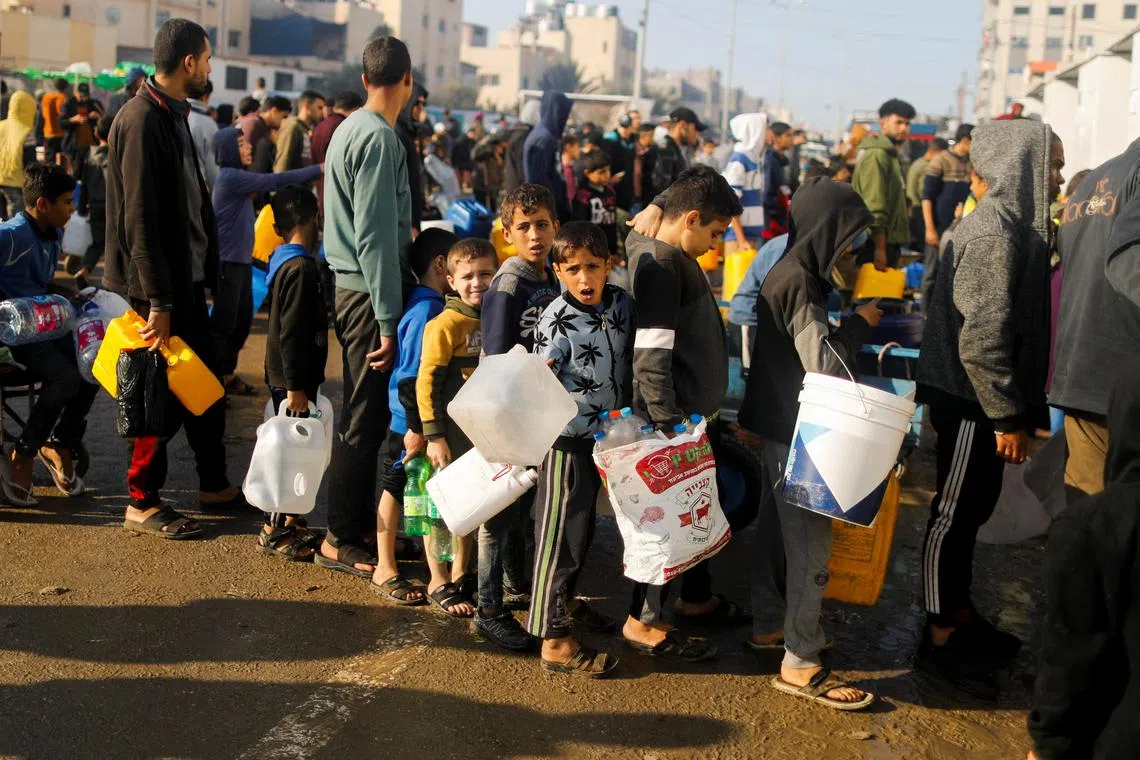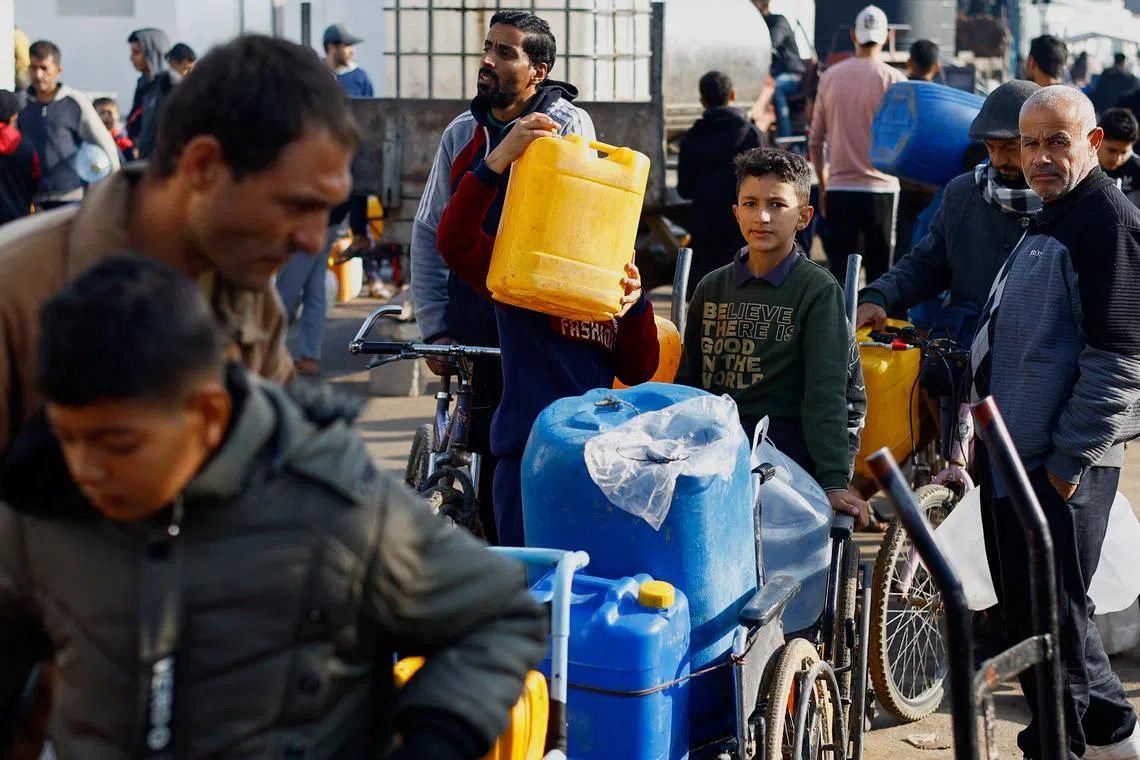Israel continues to pound southern Gaza as fears grow of widening war
Sign up now: Get ST's newsletters delivered to your inbox

Palestinian children wait to collect water, amid shortages of drinking water, in Rafah, southern Gaza Strip, on Jan 4.
PHOTO: REUTERS
Follow topic:
GAZA STRIP, Palestinian Territories - Israel pummelled southern Gaza on Jan 16, killing dozens, even as the authorities announced the winding down of the intense phase of the war
The government of Israeli Prime Minister Benjamin Netanyahu has come under mounting international pressure to end its offensive in Gaza launched in response to Hamas’ unprecedented attacks on Oct 7.
But fears are mounting that the war could be widening, with Iran and its proxies stepping up attacks across the region in solidarity with Hamas, the Islamist movement that rules the Palestinian territory.
The latest wave of Israeli strikes killed at least 78 people in the Gaza Strip, Hamas’ press office said. An AFP journalist said the southern city of Khan Younis was hit hard.
A barrage of 50 rockets was fired later towards Netivot in southern Israel, without causing any casualties, the army said. The attack was claimed by Hamas’ armed wing, the Ezzedine al-Qassam Brigades.
Live footage from AFPTV showed trails of smoke and explosions ringing out as Israel’s air defences intercepted rockets near the Gaza border.
Fighting has ravaged Gaza since Oct 7, when Hamas militants carried out an unparalleled attack on Israel
Militants also seized about 250 hostages and dragged them back to Gaza, 132 of whom Israel says are still in the coastal territory, including at least 25 believed to have been killed.
At least 24,285 Palestinians, around 70 per cent of them women, young children and adolescents, have been killed in Gaza in Israeli bombardments and ground operations
Khan Younis has been the focus of Israeli military operations since the army said on Jan 6 that it had dismantled Hamas’ military structures in the north and was shifting its focus to the south.
Israeli Defence Minister Yoav Gallant said on Jan 15 that intense operations would soon be winding down in the territory’s south.
“In southern Gaza, we will reach this achievement, and it will end soon, and in both places, the moment will come when we will move to the next phase,” he said, without specifying a timeframe.
The Israeli army announced on Jan 16 the death of two more soldiers in Gaza, bringing the total number killed since its ground invasion began to 190.
UN Secretary-General Antonio Guterres on Jan 15 reiterated calls for a stop to the fighting.
“We need an immediate humanitarian ceasefire to ensure sufficient aid gets to where it is needed, to facilitate the release of the hostages, to tamp down the flames of wider war – because the longer the conflict in Gaza continues, the greater the risk of escalation and miscalculation,” he said.
Israeli officials have repeatedly warned that the fighting in Gaza will go on for months.
Violence involving regional allies of Iran-backed Hamas – considered a terrorist group by the United States and the European Union – has surged since the war began.
Yemen’s Houthi rebels, who say they act in solidarity with Gaza, claimed a missile strike on a US-owned cargo ship
In another such attack, a missile struck a Greek-owned cargo ship in the Red Sea off Yemen, maritime risk management company Ambrey said on Jan 16.
The US military said it had seized Iranian-made missile parts that were en route to the Houthis on a boat in the Arabian Sea.
Iran’s Islamic Revolutionary Guard Corps (IRGC) said it carried out a missile attack that destroyed “the Zionist regime’s (Israel) spy headquarters
The IRGC said it also struck a “gathering of anti-Iranian terrorist groups” in Erbil, the capital of Iraqi Kurdistan, and hit a number of Islamic State in Iraq and Syria (ISIS) group targets in Syria.
Iraq condemned the strikes as an attack on its sovereignty.
It dismissed Iran’s claim that it had hit an Israeli intelligence base, saying it struck a businessman’s house, and he was among four people killed.
Iran defended the strikes, saying they were a “targeted operation” and “just punishment” against those who breach its security.
On Jan 16, the Israeli army said it conducted air and artillery strikes on Hezbollah, the powerful Iran-backed Shi’ite movement across the border in Lebanon.
The United Nations says the Israel-Hamas war has displaced roughly 85 per cent of Gaza’s 2.4 million population, many of whom have been forced to crowd into shelters and struggle to get food, water, fuel and medical care.
As temperatures plunge, families living in makeshift tents in Rafah have resorted to burning plastic to ward off the chill, despite the noxious fumes.
“I pray every day that we will all be martyred. Death is better than this life,” said Mr Adbul Karim Muhammad, a 29-year-old father of three whose family fled to Rafah from the Jabalia refugee camp in northern Gaza.
The Israeli public, meanwhile, has kept up intense pressure on the government to secure the return of the hostages seized by Hamas on Oct 7, with the militant group on Jan 15 announcing the deaths of two more captives.

A Palestinian boy queues to collect drinking water, in Rafah, southern Gaza strip, on Jan 9.
PHOTO: REUTERS
Hamas’ armed wing released a video showing a woman hostage, speaking under duress, revealing that two men she was held with had been killed in captivity.
It blamed “the Zionist army’s bombing” for their deaths.
Israeli army spokesman Daniel Hagari rejected the cause of death as a “lie”, but added: “We know that we hit targets near the location where they were held.” He said an investigation was under way.
Ms Hagit Chen, the mother of one of the hostages, said at an event in Berlin that it was “hard to live, to sleep, to breathe, to eat” because she had heard nothing from her son Itay, 19, since Hamas took him captive. AFP

